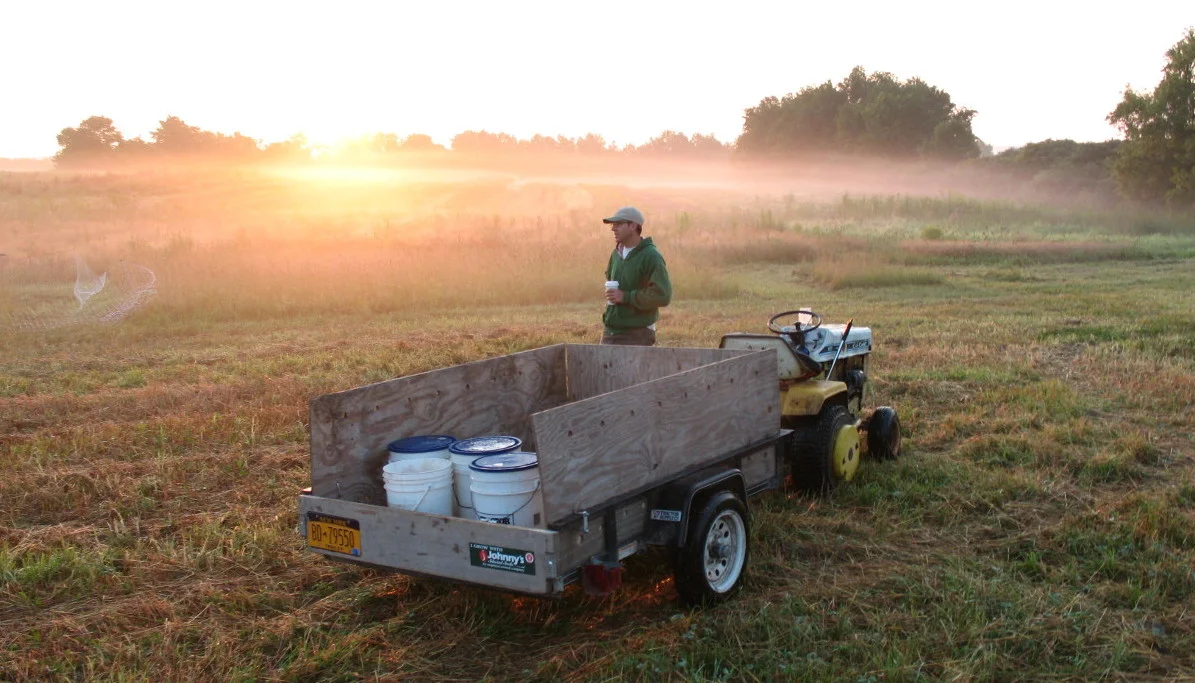What Keeps Farmers Up at Night?
/I know, this is supposed to be my week for a happy blog, and I do have some in the works! But, I can’t stop thinking of this newsletter article from yesterday, so my phobias are bumping our happy greenhouse stories to next week.
Here’s the link to the newsletter that raised my paranoia level five notches.
(And yes, maybe I’d be less stressed if I didn’t spend my downtime during a pandemic reading about climate change, but I can’t help myself. It’s a problem I have.)
Let’s get back to HAIL. And insurance.
Ever since we got hammered at the farm in 2017, at the back of our heads every single time the sky turns dark is the question—is this the storm that destroys everything? Part of the decision to buy another high tunnel this year was wanting to put more high value veggies under at least a little bit of protection.
Hail is a weird problem because it’s so spotty and unpredictable. We might get it at our farm while our neighbor doesn’t. Once in 2016 after our big storm, we drove over to Greyrock Farm for an event, which is four and a half miles as the crow flies. Their fields were fine and ours were fine, but between the two farms, we drove through smashed branches and stripped trees.
Calling out hail as America’s most under-rated climate risk resonated with me, because even with Covid and heavy snow in May and random frosts and windstorms, hail is the one thing that deeply scares me as a farmer.
What do you do when the sky opens up like this?
Or this picture from poor Guadalajara in 2019 when they got three FEET of hail (picture from the NY Times, click on it for the story link)? WTH?
There’s nothing you can do. Heck, even with greenhouses and plant covers, there’s no protection for hail like that.
The newsletter highlighted insurance companies (specifically, car dealership insurers) and how they are collecting more data about the expansion of hail damage in the US. This brings me to insurance, a question we get from folks pretty regularly.
Yes, federal crop insurance is a thing, but it’s not as easy or straightforward as getting a policy for a house burning down, workers getting hurt, coolers failing and turning veggies to mush, or the delivery van getting into an accident (all of which we do have reasonable insurance for).
For crops, there are just so many factors that are part of insurance and of payouts—did the farm do what needed to be done to prevent a crop failure? Was there a real disaster event? Can you prove it? What about crops that are worth more than others—is that radish bunch worth 25 cents or 3 bucks? How do you indemnify a situation with as much fundamental uncertainty as farming?
We are the sort of farm that it’s essentially impossible to insure in a system aimed at commodity agriculture because we just grow so many crops, all in small amounts compared to five thousand acres of wheat or a thousand acre apple orchard. Over two thirds of our veggies go to our great CSA members, which some insurers consider an uninsurable marketing arrangement (since there’s “risk” inherent in the CSA relationship). Other insurance options are based on past income, but even in non-CSA sales at market, farm income fluctuates based on when holidays fall and if it’s rainy at market and what’s going on in a community or down the road. Even now that we’ve been in business long enough to secure a policy, it seems like a bad deal to pay in to something that only covers losses once they hit 50% and then only pays 50 or 60 cents on the dollar after losses hit that point.
Rain, Rain, Go Away! This is from one of the wetter summers (when fortunately we had some tomatoes in the high tunnel as well!)
Instead, we cover up crops as best we can when the sky turns grey, replant when the clouds solidify into hail, trust that our members and customers understand if things happen (in 2017, we were relieved that most folks were cool buying and eating veggies with some hole action), and hope for the best as much as we can.
Which brings me at last to something I’ve been thinking about a lot this year, and that lies at the root of my hail fears: uncertainty.
Most of what is stressful or hard in farming is the constant uncertainty that underlies everything you do when working in a field that intersects with nature. We can do our best, but still might not have success. Sometimes there’s a freeze or hail or injury or just plain old crop failure. We hedge our bets, plan for the worst, and build in all sorts of protections and redundancies, but there is always risk and uncertainty.
I am a super uptight, type A person with anxiety issues that likes to plan and control for everything. I have absolutely no idea why I like farming and survived in this field all these years coexisting with the level of uncertainty farmers have every minute of every day (maybe it’s the beer or the ice cream?).
I never considered the ability of farmers to develop and practice coping skills around uncertainty as something positive. In fact, most of my adult life I’ve worked to be less anxious about uncertainty.
It’s only in a world now shaken up from Covid, where we can’t plan ahead like we used to, or feel confidence in knowing what’s coming, or be able to insure our way to a positive outcome, that I’m finally seeing that learning how to deal with disconcerting levels of uncertainty is a skill I guess I’m okay with having. But it’s also a series of fears, stresses, and experiences I wish that all you non-farmers out there could have been spared, because like hail, uncertainty sucks.
This was the scariest storm cloud of 2020, but it was all creepy menace, but not a mean field destroyer!























